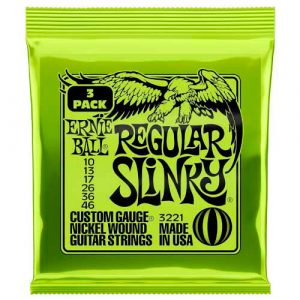Our top pick famous guitarists string gauges for you to try
Welcome, fellow string strummers and fretboard wizards! If you’ve ever stood in the musical aisles wondering, “How much are guitar strings?” while pondering whether the price tag is a direct route to stardom or just a fancy way to go broke, you’re in the right place. Today, we’re diving deep into the world of guitar strings, where the difference between a sweet melody and a sour note could just be a few dollars away.
Introduction
Ah, guitar strings: the lifeline of our beloved instruments. They can make or break our sound, our mood, and let’s not forget, our wallets. But fear not! Understanding the cost behind these magical wires can lead to better choices and, hopefully, more change left in your pocket for that coffee you’ll need after late-night jam sessions.
Understanding Guitar Strings
Types of Guitar Strings
- Acoustic: These are the soulful companions of the coffeehouse crooners. Made to project a rich, warm sound that can fill a room or serenade a sweetheart.
- Electric: The rebels of the string family, designed to cut through the mix with sharpness and clarity, ready to rock out at a moment’s notice.
- Classical: The sophisticated ones, often made of nylon for a softer, more melodic tone, perfect for those who prefer Bach over rock.
Gauge and Tension
Imagine this scenario: you’re on stage, the audience is hushed, and suddenly—SNAP! The issue? Incorrect string gauge selection. Opting for thicker strings translates to more tension and louder sound, yet it demands greater finger strength. When pondering how much are guitar strings, factor in not just the price but also the gauge. Making a smart choice is crucial, unless you want the embarrassment of being overshadowed by a mere string during your performance.
Materials Used in Guitar Strings
- Nylon: For the gentle at heart, offering a smooth, mellow tone that’ll make your guitar sound like it’s giving you a hug.
- Steel: The backbone of rock and country, ready to twang and bang its way through any gig.
- Nickel and Phosphor Bronze: These are the special sauces, adding their unique flavors to the mix, perfect for those looking to spice up their sound.
Factors Influencing Price
Brand and Quality
In the magical realm of guitars, much like the wizarding world, there’s a vast spectrum when it comes to string quality. If you’re wondering how much are guitar strings, think of it this way: certain brands are akin to the Hogwarts of strings, boasting superior quality and prestige, but with a price tag to match. It also depends on what you want to sound like. There are some strings made specifically for clean tones and some strings made for heavy metal. They all vary in price slightly. So let’s dive into it.
On the other hand, there are brands that deliver respectable quality at a cost that won’t have you trading in your broomstick for cash. Whether you’re after the elite or the economical, the cost of guitar strings varies as much as the schools in a spellbinder’s education.
Coated vs. Uncoated Strings
Coated strings are the vampires of the guitar world, living longer and resisting the corrosive effects of sweat, tears, and spilled drinks. Uncoated strings, on the other hand, offer a brighter tone but may need more frequent changing, making them the werewolves: wild, untamed, and not afraid to show wear.
Buying Individual Strings vs. Sets
Are you the type who loses socks in the laundry? Then buying sets might save you from ending up with a mismatched collection. However, if you’re constantly breaking that one string (looking at you, G string), then individual purchases might be your financial salvation.
Do you play bass as well as the guitar? Take a look at our review of the top bass strings for metal and let us know what you think.
Price Ranges
Budget-Friendly Options
Ideal for novices or players who like to swap out their strings with the frequency of new thoughts, how much are guitar strings doesn’t always have to signal a hefty investment. These strings are budget-friendly and, truth be told, they can often resonate with a quality that belies their modest price.
Mid-Range Choices
The middle ground, where cost meets quality in a harmonious blend, like a perfectly tuned guitar. Ideal for the semi-serious musicians who want to step up their game without selling their soul.
Premium Strings
These are the crème de la crème, for those who hear the difference between good and ethereal. If your ears are finely tuned and your wallet is ready, these strings can elevate your music to new heights.
Shopping for Guitar Strings
Where to Buy Guitar Strings
The eternal question: online or in-store? Online shopping lets you compare prices while wearing pajamas, but in-store shopping offers that personal touch, like having a wise guitar sage at your disposal. Choose based on whether you value convenience or the chance to strum a few notes before buying.
How to Find Deals and Discounts
Bargain hunting for guitar strings can be as thrilling as landing a perfect solo. Sign up for newsletters, stalk your favorite stores on social media, and befriend the local shop owner. You never know when the next big sale might drop, turning you into the hero who scored premium strings at a fraction of the cost.
Subscription Services for Guitar Strings
Welcome to the subscription service generation, where the question how much are guitar strings gets a modern twist. For a simple monthly fee, you can have brand-new strings delivered right to your door, ensuring you never have to pluck on rusty wires again. Select your preferred strings, relax, and leave the days of frequent string shopping behind you.
Maintenance and Longevity
Extending the Life of Your Strings
Here’s a secret: wiping down your strings after playing is the equivalent of brushing your teeth. It keeps them sounding fresh and prolongs their life, saving you money in the long run. Plus, it gives you a moment of zen with your instrument, thanking it for its service in making you look cool.
Signs It’s Time to Change Your Strings
When your guitar’s tone begins to sound as though it’s muffled, much like it’s being played from behind a barrier, it’s a clear indicator that it’s time to consider changing your guitar strings.
Other clear signs it’s time to look into this include noticeable rust on the strings, a rough texture to the touch, or if tuning the guitar feels more like guesswork than precision. It’s essential to remember that replacing your guitar strings is akin to the routine maintenance of changing your vehicle’s oil: failure to do so could lead to dire consequences for your instrument’s performance.
The Impact of Playing Style on String Life
If you play like you’re trying to wake the gods, expect to change your strings more often. Gentle strummers will find their strings last longer, but where’s the fun in that? Find your style, and just budget for strings accordingly. It’s all part of the rock star life.
Section 6: Making Your Choice
How to Choose the Right Strings for Your Guitar
Matching strings to your guitar is like choosing the right outfit for a first date. You want to impress, but you also need to be true to yourself. Consider your guitar’s body and make, your musical genre, and your personal play style. When in doubt, experimentation is your best friend. Strings are the spice of life, after all.
The Role of Strings in Guitar Tone
The right strings can turn your guitar from a shy wallflower into the life of the party. They’re the secret sauce that can brighten, mellow, or sharpen your sound. Think of them as your guitar’s voice, and you’re the vocal coach. It’s your job to make them sing.
Durable Guitar Strings
When considering how much are guitar strings, don’t overlook the importance of durability. For those seeking strings that endure, options like coated strings or those crafted from robust materials such as titanium are worth exploring. Not only does durability help in saving money over the long haul, but it also guarantees a steady quality of sound through many performances and practice sessions.
Acoustic vs. Electric Strings
The battle between acoustic and electric strings is as old as the guitar itself. Acoustic strings, typically made from phosphor bronze or 80/20 bronze, offer a bright, clear sound. Electric strings, usually made from nickel-plated steel, provide a smoother feel and a more magnetic response for amplification.
Guitar String Brands Comparison
Not all strings are created equal. Brands like Ernie Ball, D’Addario, and Elixir have their unique formulas and technologies, from Elixir’s NANOWEB Coating to D’Addario’s NYXL’s increased pitch stability. Experimenting with different brands can help you find your perfect match.
Changing Guitar Strings Guide
The process of changing guitar strings is an essential skill for every guitarist. When you’re looking at how much are guitar strings, remember that the cost includes more than just the price—it’s also about the care and time you invest. The crucial steps involve taking off the old strings, giving the fretboard a good clean, putting on the new strings, and then stretching them correctly to keep your guitar in tune.
Guitar String Maintenance Tips
To prolong the life of your strings and maintain sound quality, clean them regularly with a soft cloth or string cleaner. Also, washing your hands before playing can prevent oils and dirt from transferring to the strings.
Guitar String Tuning Techniques
Proper tuning is essential for good sound. Techniques include using a tuner, tuning by ear through reference pitches or harmonics, and adjusting for intonation to ensure the guitar sounds in tune along the fretboard.
Cost of Nylon vs. Steel Strings
Nylon strings, typically used on classical guitars, are generally cheaper than steel strings used on acoustic and electric guitars. The difference in cost reflects the materials and manufacturing processes involved.
Guitar String Life Expectancy
When you’re budgeting for replacements and pondering how much are guitar strings, consider their lifespan, which is influenced by factors such as the string material, your playing style, and how well you maintain them. Some guitarists may need to change strings every month, while others discover their strings remain vibrant for several months up to a year.
How to Buy Guitar Strings Online
Purchasing strings online offers convenience and variety. Look for reputable retailers or direct brand stores, read reviews, and consider bulk purchases to save on costs.
We’ve just listed our top singers with raspy voices. Take a read and let us know if you agree with us… Trust us, there are some good ones in the list!
Guitar String Materials Explained
Guitar strings can be made from a variety of materials, each affecting tone and feel. Common materials include nickel, phosphor bronze, nylon, and more exotic options like cobalt or titanium for specific tonal qualities.
Single Strings vs. Pack Purchase
Buying single strings can be cost-effective for players who break strings frequently or use unconventional tunings. However, purchasing packs is generally more economical for standard setups and ensures tonal consistency across strings.
Coated Guitar Strings Review
Coated strings, like those from Elixir, offer extended life by protecting against moisture and dirt. While some players find they slightly alter the tone, many appreciate the longer intervals between changes.
Guitar String Sound Quality
When it comes to sound quality, it’s all about personal taste, which can change with the string material, thickness, and what you prefer. This is why experimenting is crucial as you navigate through the options. While contemplating how much are guitar strings, remember that the price can reflect the potential for your guitar to produce the bright and clear or warm and deep tones you’re searching for.
String Bending Techniques
Bending is an expressive technique that can test a string’s durability and tuning stability. Heavier gauge strings offer resistance for more expressive bends, while lighter strings are easier to bend but may break more easily.
Fingerpicking Strings Selection
Fingerpickers might prefer lighter gauge strings for ease of play or coated strings for smoother feel. Material choice can also impact the tone, with nylon offering a softer sound compared to the bright attack of steel.
Guitar String Allergy Considerations
Players with metal allergies should consider coated strings or those made from hypoallergenic materials like polymer-coated or synthetic options to avoid irritation.
Environmental Impact on Guitar Strings
The production and disposal of guitar strings contribute to environmental concerns. Players can look for brands that prioritize sustainable practices or participate in recycling programs.
Budget-friendly Guitar Strings
Affordable strings don’t necessarily mean low quality. Many brands offer budget-friendly options that still deliver excellent sound and durability, perfect for beginners or those needing to change strings frequently.
Guitar String Recycling Options
Some companies and music stores offer guitar string recycling programs to mitigate environmental impact. Recycling old strings can help reduce waste and sometimes even support charitable causes.
Seasonal Effects on Guitar Strings
Fluctuations in humidity and temperature can have a significant impact on the lifespan and tuning stability of guitar strings, leading one to question – how much are guitar strings?
In environments with higher humidity, strings may corrode more quickly, whereas in dryer conditions, strings might become brittle and prone to snapping. By adjusting your choice of guitar strings or enhancing your maintenance practices as the seasons change, you can ensure your guitar maintains its optimal sound quality throughout the year.
Conclusion
And there you have it, a comprehensive guide that answers the age-old question, “How much are guitar strings?” We’ve strummed through the basics, picked apart the details, and hopefully, tuned into your needs as a budding or seasoned guitarist.
Remember, the right strings can elevate your music, but it’s your passion, practice, and persistence that truly make the difference. So, go forth, experiment with different strings, find your unique sound, and above all, keep the music playing.
If you are enjoying this post, check out our review of the lightest electric guitars.
FAQ Answers: How much are guitar strings
1. What are the main types of guitar strings?
The main types are acoustic, electric, and classical. Acoustic strings are typically made from steel or phosphor bronze, electric strings are usually made from nickel-plated steel, and classical strings are primarily nylon.
2. How does string gauge affect a guitar’s playability and tone?
Thicker strings (higher gauge) produce a fuller, louder sound but require more finger pressure to play, affecting playability. Thinner strings (lower gauge) are easier to play and bend, offering a brighter tone.
3. What materials are commonly used in making guitar strings?
Common materials include steel, nickel, phosphor bronze, and nylon. The choice of material affects the string’s tone and durability.
4. How do brand and quality influence the price of guitar strings?
When you’re in the market for new strings and ask yourself, “how much are guitar strings,” be aware that the higher prices of well-known, quality brands reflect their reputation for lasting durability, superior tone, and consistent performance. Yet, it’s worth noting that there are also many cost-effective brands that provide high-quality strings without the premium price tag.
5. What’s the difference between coated and uncoated strings?
Coated strings have a thin layer of polymer that protects against corrosion and dirt, extending their life but sometimes slightly altering the tone. Uncoated strings have a brighter tone but may not last as long.
6. Should I buy individual strings or a set?
Buying a set is usually more cost-effective and ensures consistent tone and quality across all strings. Individual strings are useful for replacing a broken string or customizing your string set.
7. Does the country of manufacture affect the cost of guitar strings?
It can, as strings made in countries with higher manufacturing costs may be more expensive. However, this is not always a direct indicator of quality.
8. What are some budget-friendly options for guitar strings?
Many brands offer affordable options that do not compromise on quality. Research and read reviews to find the best value for your needs.
9. What distinguishes mid-range strings from premium ones?
Mid-range strings present a compromise between quality and affordability, making them a fitting choice for the majority of players who might ponder how much are guitar strings. On the other hand, premium strings, which could be higher in cost, often utilize superior materials or adopt specialized production techniques to enhance both tone and longevity.
10. Where is the best place to buy guitar strings?
Both online retailers and local music stores are great options. Online shopping offers convenience and a wide selection, while local stores provide personal service and expert advice.
11. How can I find deals and discounts on guitar strings?
Sign up for newsletters from music stores, follow brands on social media, and check online marketplaces for sales and bulk deals.
12. Are subscription services for guitar strings worth it?
They can be, especially for frequent players who change strings often. Subscription services offer convenience and sometimes discounts on regular purchases.
13. What are some tips for extending the life of my guitar strings?
Regularly clean your strings with a soft cloth, wash your hands before playing, and store your guitar properly to protect the strings from environmental damage.
14. How can I tell when it’s time to change my guitar strings?
Change your strings when they start to look dull or discolored, feel sticky or rough, sound dull, or have difficulty staying in tune.
15. Does my playing style affect how often I should change my strings?
Indeed, engaging in forceful playing or often bending the strings can accelerate their wear, leading to a higher frequency of replacements and prompting the question – how much are guitar strings?
16. How do I choose the right strings for my guitar?
Consider your guitar type, music style, and personal preference for tone and playability. Experiment with different brands and gauges to find what works best for you.
17. Can the choice of strings significantly alter my guitar’s tone?
Absolutely. Different materials, gauges, and construction can dramatically change the sound, brightness, and warmth of your guitar.
18. Is it okay to mix and match strings from different sets?
While not common, it can be done for customized tension and tone. However, it may lead to uneven wear and inconsistent tone.
19. How often should I replace my guitar strings?
It varies based on how often you play, but a general guideline is every 3 to 6 months for casual players and more frequently for those who play daily.
20. What are the environmental impacts of guitar strings, and can they be recycled?
Guitar strings, given their metal composition and diminutive stature, are generally not eligible for recycling via standard curbside collection, which might lead one to wonder how much are guitar strings, not just in terms of monetary cost but also environmental impact.
Nonetheless, certain recycling facilities do welcome metal strings, and there’s a growing presence of specialized recycling endeavors, including instrument repair shops and programs dedicated to the recycling of guitar strings.








